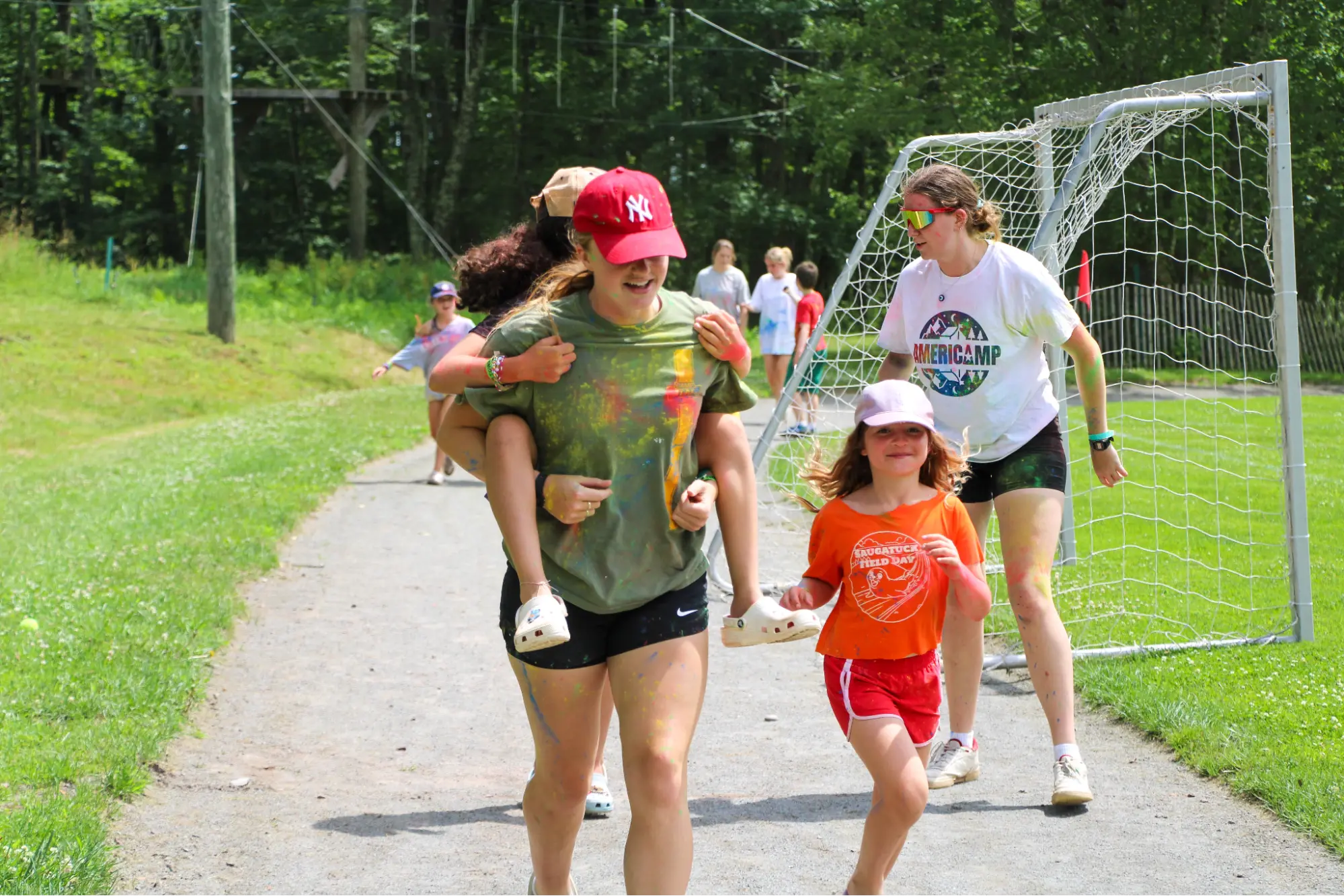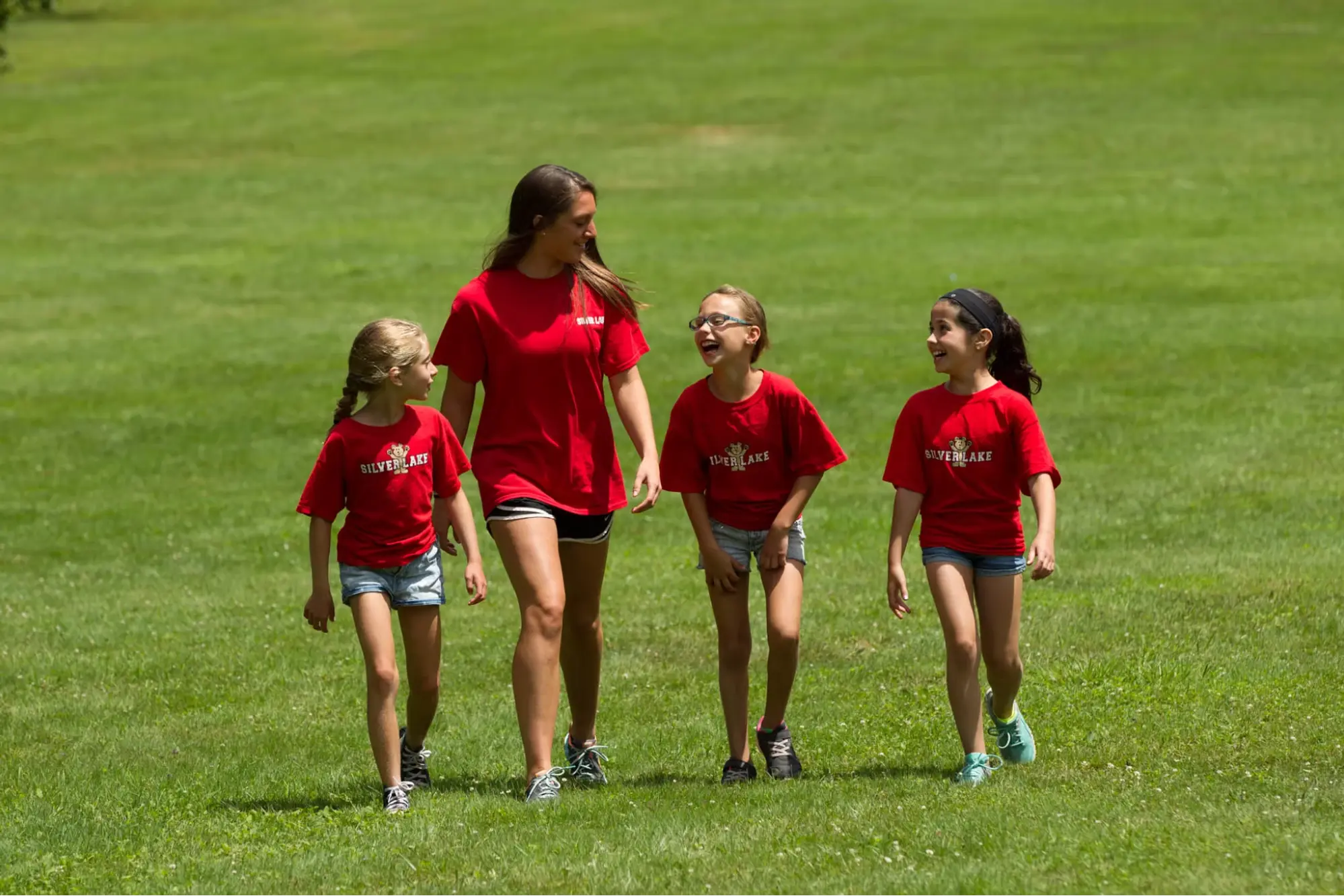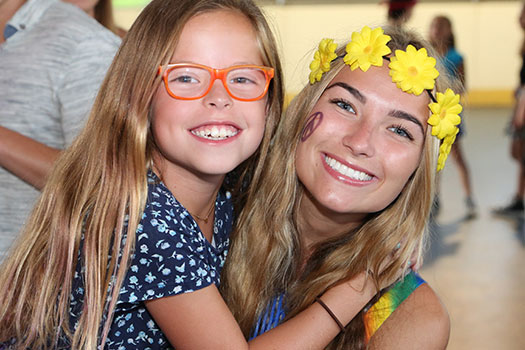The Impact of Special Needs Summer Camps [+ Become a Camp Counselor!]
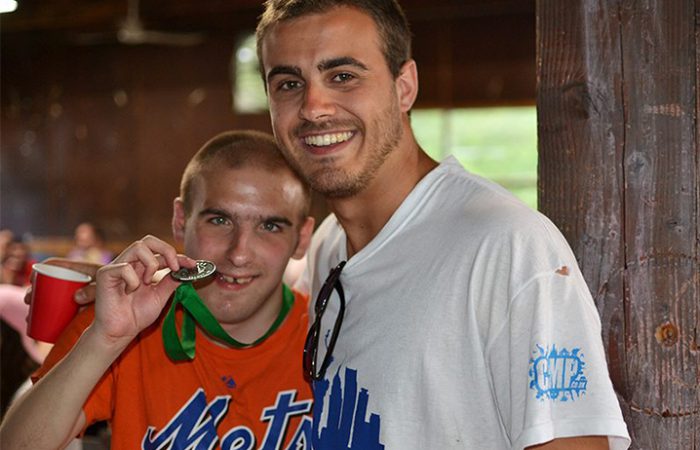
With over 240 million children across the globe living with a disability, creating inclusive and specialized programs that support all youth is essential to create equitable learning environments. Beyond the basic need for inclusive education, the creation, advocacy, and working for special needs summer camps is vital to help all children have memorable and fun vacation months where they can bond with campers and enjoy various activities.
In this article, we’ll be talking about the impact of special needs summer camps, and how you can work as a special needs camp counselor. We’ll answer questions such as:
- What are special needs summer camps?
- Why be a camp counselor at a special needs summer camp?
- Where can you find special needs summer camp jobs?
- What do you do as a special needs summer camp counselor?
At AmeriCamp, we work with over 900 camps across the United States so that you can travel across the globe, become a camp counselor at the best summer camps in the U.S.
As a J-1 visa sponsor, we help you connect with camps, support you throughout your visa application process, and offer a 99% placement success rate. Our goal is to do the heavy logistical lifting, so you can focus on starting your camping adventures.
What Are Special Needs Summer Camps?
Special needs summer camps are specialized programs designed to provide a safe, supportive, and enjoyable camp experience tailored to children and adults with varying disabilities and special needs. These camps cater to individuals with a wide range of physical, developmental, emotional, and learning disabilities.
The primary aim is to offer an inclusive environment where campers can participate in activities adapted to their abilities, enhancing their summer experience while catering to their specific needs. Special needs camps might cater to individuals with:
- Developmental disabilities such as autism spectrum disorders, Down syndrome, and cerebral palsy.
- Physical disabilities including mobility impairments, muscular dystrophy, and spinal cord injuries.
- Learning disabilities such as dyslexia and ADHD.
- Emotional and behavioral disorders, including anxiety disorders, depression, and behavioral challenges.
- Sensory impairments, like those affecting vision and hearing.
Key Features of Special Needs Summer Camps
There are five key features that are fairly standardized in special needs summer camps:
- Adaptive Programs: Activities are tailored to meet the abilities of campers, ensuring everyone can participate and enjoy themselves. This might include adaptive sports (e.g., wheelchair basketball), modified games, and tailored creative arts.
- Therapeutic Activities: Many camps incorporate therapeutic sessions into their schedule, such as physical therapy, speech therapy, and occupational therapy, to assist campers in maintaining or improving their functional abilities.
- Skilled Staff: Camps employ staff who are specially trained to work with individuals with special needs. These professionals might include special education teachers, therapists, counselors, and medical personnel who ensure a high level of care and appropriate support.
- Specialized Facilities: Facilities at special needs camps are often designed or adjusted to be accessible and safe for all campers. This can include wheelchair-accessible paths, specialized recreational equipment, and medical facilities.
- Small Group Sizes: To provide individualized attention, camps often maintain a low camper-to-staff ratio. This ensures that each camper receives the support and supervision they need to engage fully in the camp experience.
Activities at Special Needs Summer Camps
Special needs summer camps offer a variety of activities that are specialized for students with disabilities.
- Animal Care: This can be a soothing, longer term activity throughout the camp experience that promotes empathy and responsibility.
- Nature Walks: Guided nature walks along accessible trails provide campers with opportunities to explore the great outdoors, observe wildlife, and learn about the environment.
- Team Sports: Modified to include all participants, such as soccer, softball, and volleyball with rules adjusted for physical and developmental abilities.
- Team Building Activities: Low ropes courses, cooperative games, and team-building challenges promote teamwork, communication, and problem-solving skills among campers.
- Sensory-Friendly Activities: Sensory-friendly games like bean bag toss, parachute play, and sensory stations provide campers with opportunities for fun and relaxation in a supportive environment.
- Group Projects: Collaborative art projects, such as murals, sculptures, and craft workshops, promote teamwork, cooperation, and a sense of pride in collective achievements.
- Visual Arts: Painting, drawing, sculpture, and other visual arts activities encourage campers to express themselves creatively and develop fine motor skills.
- Themed Days: Themed days and special events, such as costume parties, talent shows, and cultural celebrations, create opportunities for campers to have fun, express themselves, and celebrate diversity.
Why Be a Camp Counselor at a Special Needs Summer Camp?
Being a camp counselor at a special needs summer camp offers a unique and fulfilling experience that can greatly impact both the campers and yourself. A 2017 paper on the effects of summer camps for individuals with disabilities found that campers were able to build unique friendships and build confidence, self-esteem, and autonomy after their camp experience.
A 2009 thesis on the same topic found that special needs summer camps also benefited parents of children with disabilities, as such camps provided them respite after constantly caring for their child.
There are countless other roles at camp you’ll take on that can positively impact your greater community.
Positive Influence
You have the opportunity to make a significant difference in the lives of campers with special needs. Your support, encouragement, and care can boost their confidence, social skills, and overall well-being. By creating a safe and inclusive environment, you empower campers to explore new activities, make friends, and achieve personal milestones they might not experience elsewhere. The relationships you build and the experiences you share can have a lasting positive impact on both campers and their families.
Volunteering at a special needs camp allows you to give back to the community by providing valuable support and care to individuals who often face social and recreational barriers. By promoting inclusivity and celebrating diversity, you contribute to creating a more accepting and understanding society.
Develop Personal Skills
Working closely with campers teaches empathy and patience as you learn to understand and accommodate their unique needs and challenges. You'll develop the ability to adapt activities and communication styles to ensure everyone can participate and enjoy themselves. Guiding campers through activities and fostering group dynamics enhances your leadership and communication skills in diverse and challenging situations.
Professional Experience
As a camp counselor at a special needs summer camp, you’ll gain practical experience in caregiving, behavior management, and teamwork, which are valuable in fields such as education, social work, and healthcare. Handling unexpected situations and finding creative solutions will also enhance your problem-solving skills, a crucial asset in any profession. When you are beginning to apply for jobs post-university, employers value candidates with experience in diverse and inclusive environments. Camps often provide mentorship opportunities where you can learn from seasoned professionals in related fields, potentially opening doors to future career paths.
How to Find Special Needs Summer Camp Counselor Jobs
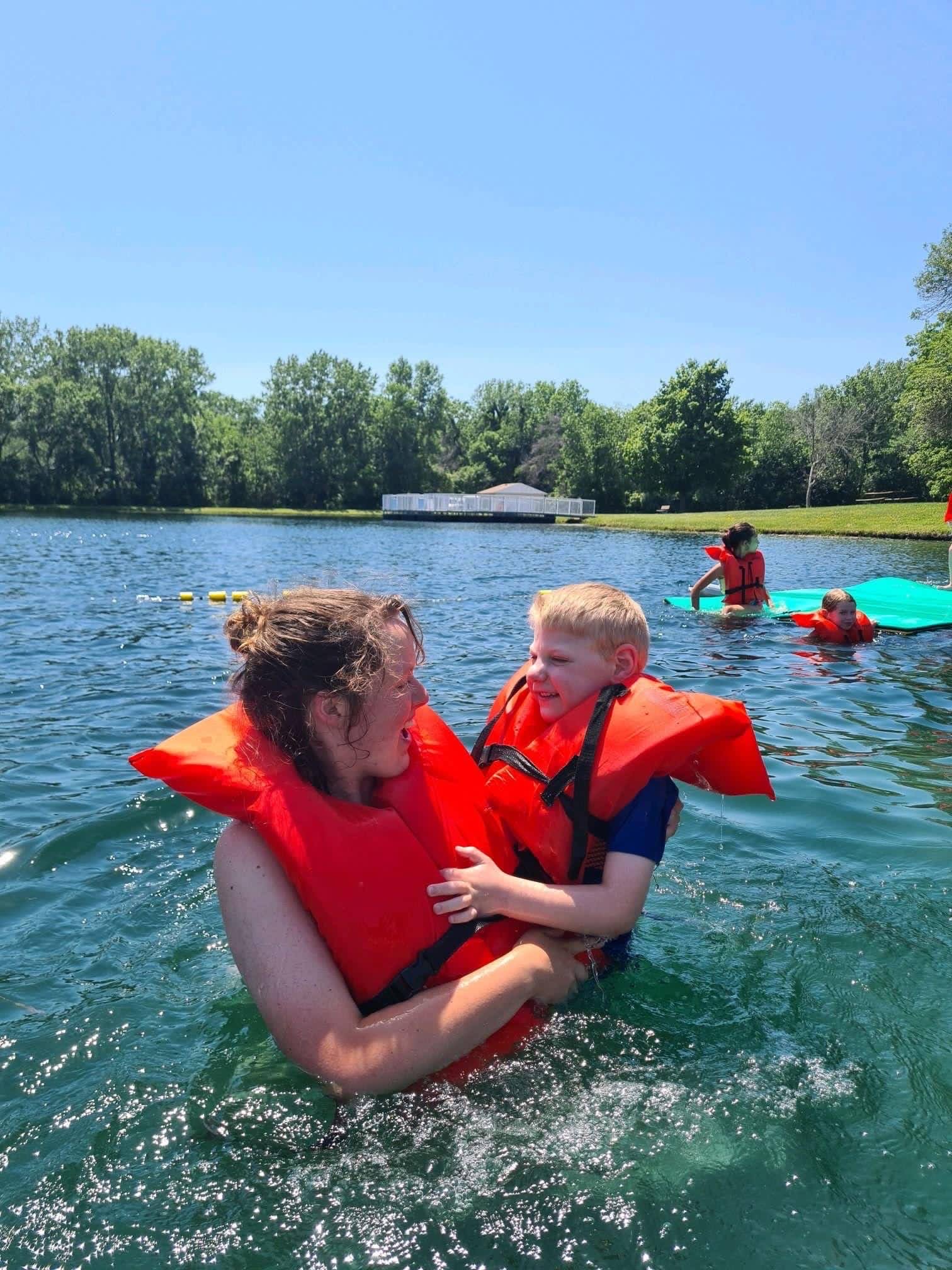
You’re now looking to start applying to special needs camp counselor jobs, but you don’t know where to start. Here’s a comprehensive list of places to do your research, and why AmeriCamp is your best option for an unforgettable U.S. camp counselor experience:
- Online job boards
- Social media
- Networking events
- University career offices
- AmeriCamp (our favorite!)
Online Job Boards
Online job boards provide a centralized platform to explore a wide range of job opportunities, including some specialized positions. One major pro is that they allow for easy filtering and searching based on location, job type, and keywords. However, keep in mind that many summer camp positions, especially specialized ones like special needs camps, may not be widely advertised on general job boards. Limited visibility for smaller or niche camps may also not have the budget or resources to post on multiple platforms.
Social Media
Social media is a great way to see live updates, camp experiences, and photos to make sure the organizations you are applying to are legit (you can check our Instagram while you're at it). For camps that are pretty active, you may be able to facilitate direct conversations with previous counselors and admin. However, camps may not have accounts or are not that active, which can prevent you from finding job opportunities that check all the marks. It also requires active engagement and networking to discover opportunities, which can be time-consuming.
Networking Events
If you are an extrovert or want to talk in-person with camp directors and industry professionals, networking events are a great way to get personal referrals and learn about best practices in the camp counseling field. Keep in mind, however, that you may have to pay for these networking events, and that they also may not be available near you.
University Career Offices
If your university has a career office, it could be a great place to go and learn more about affiliate organizations, referral programs, and other university-associated guidance on things such as resume building and preparation. They may connect you with other students and alumni who have previously been camp counselors at special needs summer camps, have experience working in the U.S., or are in industry fields related to disability studies, behavioral psychology, and more.
However, career offices tend to be more focused on internships and entry-level positions rather than camp counselor roles, and there may be limited resources with the sheer size of your university and subsequent demand.
Why Choose AmeriCamp for Special Needs Summer Camp
If you want to become a camp counselor in the U.S., you’ll need to get a J-1 visa, which is for visitors who want to temporarily work in the U.S. to build language, cultural, and career skills.
Some roles that you can have for the J-1 Visa include:
- Au pair
- Camp counselor
- College and University Student
- Government Visitor
- International Visitor
- Physician
- Professor
- Research Scholar
- Secondary School Student
- Short-Term Scholar
- Specialist
- Summer Work Traveler
- Teacher
- Trainee
The J-1 visa, unfortunately, is a lot of paperwork and legalese that you may be intimidated by at first glance. That’s why with AmeriCamp, we simplify the J-1 visa application process into four steps:
- Get connected: After contacting us or an AmeriCamp partner, you’ll get program info and a screening interview.
- Submit your documents: After the interview, you’ll be asked to submit some required documents. Once you send all of them your application will be up for consideration.
- Match with a camp: A camp selected your application–wahoo! You’ll have an interview with the camp director, and once selected, get an acceptance letter.
- Prepare for your adventure: We aren’t going to leave you hanging. As you prepare for your summer as a special needs camp counselor, we’ll provide continued support.
Our J-1 Camp Counselor Program also provides additional guidance and support throughout your camp experience, including:
- Guidance throughout your full application
- A minimum camp counselor salary of $2,000 for your camp placement
- Free accommodation and meals for the duration of your camp
- Comprehensive medical insurance throughout your time in the US
- 24/7 emergency assistance during your time in the STates
- Up to 30 days of travel in the US after your camp wraps up
At AmeriCamp, we want you to experience the best summer camps in the U.S. so that you can gain personal and professional growth while having an impactful summer experience.
What You Do as a Special Needs Summer Camp Counselor
As a special needs summer camp counselor, you’ll have the responsibility of taking care of your campers, making sure that all environments are safe and inclusive, and having loads of fun. Each day will be unique, but here is a typical day at a special needs summer camp:
- Welcome and Morning Circle (9:00 AM - 9:15 AM): Gather campers for a brief welcome, review the day’s schedule, and introduce any special activities or themes.
- Adaptive Sports and Recreation (9:15 AM - 10:30 AM): Engage campers in adapted sports activities such as wheelchair basketball, sensory-friendly games, or modified swimming sessions.
- Skill-Building Workshops (10:30 AM - 11:30 AM): Rotate through workshops tailored to campers’ interests and abilities, such as arts and crafts, music therapy, or sensory exploration.
- Snack Break and Social Time (11:30 AM - 12:00 PM): Encourage communication skills and peer interactions through structured play or conversation prompts.
- Lunch and Rest Period (12:00 PM - 1:00 PM): Provide a quiet space for campers who may need sensory breaks or rest time after the morning activities.
- Nature Exploration and Outdoor Adventures (1:00 PM - 2:30 PM): Lead guided nature walks, adaptive hiking trails, or outdoor scavenger hunts based on campers’ mobility and sensory needs.
- Therapeutic Sessions (2:30 PM - 3:30 PM): Focus on relaxation techniques, emotional regulation, and self-expression through creative mediums.
- Free Play and Recreation (3:30 PM - 4:00 PM): Provide structured free play opportunities where campers can choose activities based on their interests.
- Dinner and Group Gathering (5:00 PM - 6:00 PM): Celebrate achievements and reinforce positive social interactions among campers.
- Evening Entertainment and Special Events (6:00 PM - 7:00 PM): Create opportunities for campers to showcase their talents and build self-confidence in a supportive environment.
- Campfire and Reflection Time (8:00 PM - 9:00 PM): Gather around a campfire for storytelling, sing-alongs, or sensory-friendly activities like glow-in-the-dark games.
- Bedtime Routine and Lights Out (9:30 PM - 10:00 PM): Assist campers with bedtime routines, including personal care, medication administration, and sensory accommodations.
Special Needs Summer Camp Counselor Responsibilities
As a special needs camp counselor, your primary responsibility is to ensure the safety, well-being, and enjoyment of campers with special needs. Typical job responsibilities can include:
- Providing hands-on care and supervision to campers with special needs, assisting with daily living activities as required.
- Organizing and leading tailored recreational activities such as sports, arts and crafts, nature exploration, and sensory-friendly games to meet diverse camper needs and interests.
- Cultivating inclusive and supportive environments that foster camper inclusion, social connections, and friendships.
- Employing behavior management techniques and interventions to promote positive behaviors and develop conflict resolution skills among campers.
- Maintaining effective communication with campers, their families, and fellow staff members to share updates on camper progress, concerns, and achievements.
- Collaborating with camp healthcare professionals, therapists, and support staff to ensure holistic camper well-being and smooth program operations.
- Acting as a positive role model and mentor to campers, encouraging independence, self-confidence, and advocacy skills.
- Participating actively in staff training, meetings, and professional development opportunities to enhance knowledge, skills, and effectiveness as a camp counselor.
Special Needs Summer Camp Counselor Prerequisites
To qualify for a special needs camp counselor position, you should be able to fulfill these prerequisites:
- Minimum age requirement: At AmeriCamp, you are required to be 18 years or older to apply for any camp counselor job. This tends to be the standard for the camp counselor positions.
- Strong interpersonal and communication skills: Ability to build rapport and establish positive relationships with campers and fellow staff members.
- Patience, empathy, and compassion, along with a genuine desire to make a difference in their lives.
- Physical stamina and energy to engage in outdoor activities and provide hands-on assistance and support to campers as needed.
- Ability to adapt to various situations and environments, including outdoor settings, varying weather conditions, and challenging behaviors.
- Willingness to undergo background checks as required by camp regulations and policies.
Build Community at a Special Needs Summer Camp Today!
As a special needs summer camp counselor, you’ll have an unforgettable experience where you can bond with campers, learn new teaching and leadership methods, and develop long lasting friendships with your peers.
AmeriCamp is dedicated to connecting potential camp counselors with summer camps that best match their skills and desired experiences. Over the years, we have linked thousands of participants from all corners of the globe to summer camps across the United States.
You can attend our Camp Fair to explore your options, which is an exclusive event where you can connect with camp representatives and discover the perfect match for your summer adventure. We have camps around the world for you to experience if you want to check out various camp counselor opportunities.
You can also check out our FAQs if you have some questions you want answered, or contact us if you have any other concerns—we love to hear from you.
What are you waiting for? Apply now and get ready to build community, make impact, and have fun!

